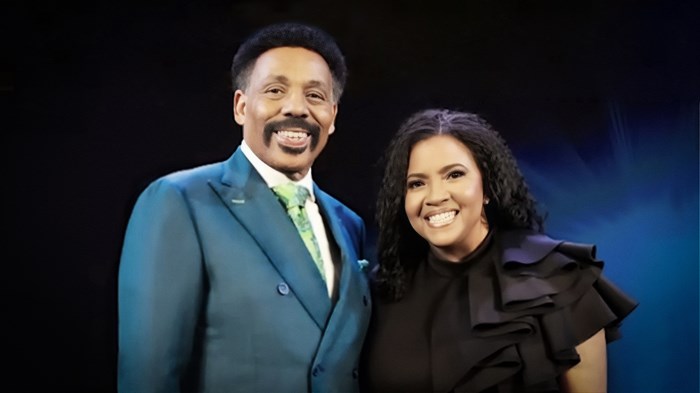
Tony Evans stood before his Dallas congregation last week—with keyboards playing softly in the background and his four adult children standing behind him—to announce that nearly four years after losing his wife Lois, he was engaged to remarry.
“God, in his sovereignty, has brought someone into my life,” the 74-year-old told the crowd, which broke out in applause. He introduced Oak Cliff Bible Fellowship to his fiancée Carla Crummie, a widow who had lost her husband around the same time as Lois’s passing.
The announcement came with a sense of both somberness and celebration. “Pray for us,” he asked the church, calling it a “sensitive” and “tender” time.
Evans had been married to Lois for 49 years before she died of cancer at the end of 2019, and the famous preacher described how she had been his partner in life and ministry. He told his church, “This may evoke some grief in some people, which I can understand, because we’re reminded about the fingerprints”—the legacy of his late wife.
Christians who have lost their spouses know firsthand the mixed emotions that come with remarriage.
“I’m more aware than most people of the reality of joy and grief that need to coexist in the life of a godly person,” said Jonathan Pitts, who attended the service along with dozens of ministry colleagues to celebrate Evans’s birthday. Pitts lost his wife of 15 years, Wynter, in 2018. She was Evans’s niece.
“I was there to grieve with those who grieve but also rejoice with those who rejoice—to rejoice with Dr. Evans that he’s found love again and companionship, knowing that that tension is not a problem to be solved but a tension to be managed,” said Pitts, a pastor in Franklin, Tennessee, and the former executive director of Evans’s resource ministry, the Urban Alternative. “We, more than all people, should know how to walk in that space with integrity and with peace and with hope.”
While plenty of churches offer ministries for the bereaved and premarital counseling for new couples, fewer Christian resources are tailored to the unique family dynamics brought about by remarriage after death. Widows and widowers may not anticipate their emotional and spiritual needs as they move into a new relationship, or how their relatives will feel.
“One of the biggest mistakes people make is they think, ‘I have to turn off my grief now that I’m married to you and not be sad over my previous partner,’” said Ron Deal, a marriage and family therapist who serves as the director of FamilyLife Blended.
“So when the new partner gives permission to that ongoing expression of grief, we’re both free to deal with our past and our loss and at the same time be making steps forward in our new relationship. The past and the present are not in competition unless you make it a competition.”
Families’ experiences of grief can vary depending on the age, timing, and circumstances around a death, but Deal said people are prone to underestimate how much remarriage will affect their children, even as adults.
While grown kids may encourage their moms or dads to find someone after losing their spouse, it can be a challenge for kids when it actually happens. They see a different side of their parent, may worry about the financial implications of the new marriage, and are inevitably reminded of the parent they’ve lost.
Widows and widowers are more likely to have adult children, since the older you are, the more likely you are to have lost a spouse. Well over half of married women over 75 have gone through the death of a husband at some point, according to data from the US Census Bureau. But fewer than five percent of the 1.4 million people whose spouses died were under 45.
Pitts was left a single father to four daughters when his wife died at just 38, weeks after they moved from Texas to outside Nashville. Together, the Pitts family remembered Wynter by lighting a candle to symbolize her presence at holiday meals, telling stories about her, and carrying on her nonprofit ministry For Girls Like You.
Two years ago, Pitts married Peta Sergeant, an actress from Australia. He described “fighting for celebration,” stewarding both joy and grief while knowing the loss of his first wife would always be part of him and his family.
“One of the most isolating places to be is walking into remarriage … my now-wife Peta would say that she became an instrument of grief, but our marriage became an instrument of grief,” Pitts said. “What happens is that newness of life together, it provokes the grief of everyone else.”
“I couldn’t imagine not being married to Wynter, but all of a sudden now I have a new wife and can’t imagine not being with her,” he said. “Imagine the complication of that for a child or a mother-in-law or a father-in-law, or even your own feelings around it. It’s so confusing.”
After becoming a widow twice, losing one husband to an aneurysm and the other in an Air Force plane crash, Rachel Faulkner Brown has worked to offer spiritual support and care for fellow widows through Never Alone Widows.
She has seen over a hundred widows involved in the ministry marry again in the past few years. The transition, she says, can be another form of loss—after losing your spouse, you also lose a part of your old life when you enter another relationship.
“Remarriage is a death to everything, a transition to new life,” said Brown, who lives outside Atlanta. “If you don’t understand death and resurrection, you won’t understand remarriage.”
Her ministry’s retreats can be a place for women to be open and honest about their loss with others who get it, things like how to balance remembering and honoring your first husband while investing in your new relationship.
Brown said marrying a widower can be an appealing option for women who have lost their spouses young. “That’s the quintessential ‘You get me, you understand me, you feel safe’ option,” she said. “But there are way more widows than widowers. Widowers don’t stay single as long.”
Christian resources by Robert DeVries and Susan Zonnebelt-Smeenge, a Calvin Theological Seminary professor emeritus and clinical psychologist who married after losing their first spouses in the 1990s, emphasize the importance of working on intentional goals through the grieving process. They include: accepting the reality of a spouse’s death, processing emotions, storing away memories, discovering an identity outside of the previous marriage, and reinvesting in a “new normal.”
“Good-bye is difficult to say … you will say it hundreds of times to all the various aspects of life you shared with your spouse,” they write in their book From We to Me. “You will realize it each time you do something new without your previous spouse. And one day you will know it’s time to say the final good-bye.”
Deal estimates that between 30 and 40 percent of weddings today form blended families, whether following death or divorce. These relationships are more complicated than first marriages. They disrupt relationships with children (and for older widows and widowers, their grandchildren), holiday traditions, and financial and estate planning. He sees the potential for the church to better counsel and equip those who remarry for their new reality.
Some widows and widowers don’t have those tough conversations until they’ve already found a new partner, but some learn along the way through support groups like GriefShare and specialized ministries like Never Alone Widows and Refuge Widowers.
Outside of organized groups, Pitt found himself connected with fellow widowers through mutual friends and fellow pastors. He knows how difficult the journey can be but believes, by God’s grace, it’s something people can get through and also flourish in.
“The grief journey and healing is like a ministry that God has given me that I never would have signed up for that I actually really love. I love being with people that get to experience God in hardships,” he said. “When you walk through loss, it doesn’t just happen to you. It’s something that you become and something you live with.”

Support Our Work
Subscribe to CT for less than $4.25/month


















